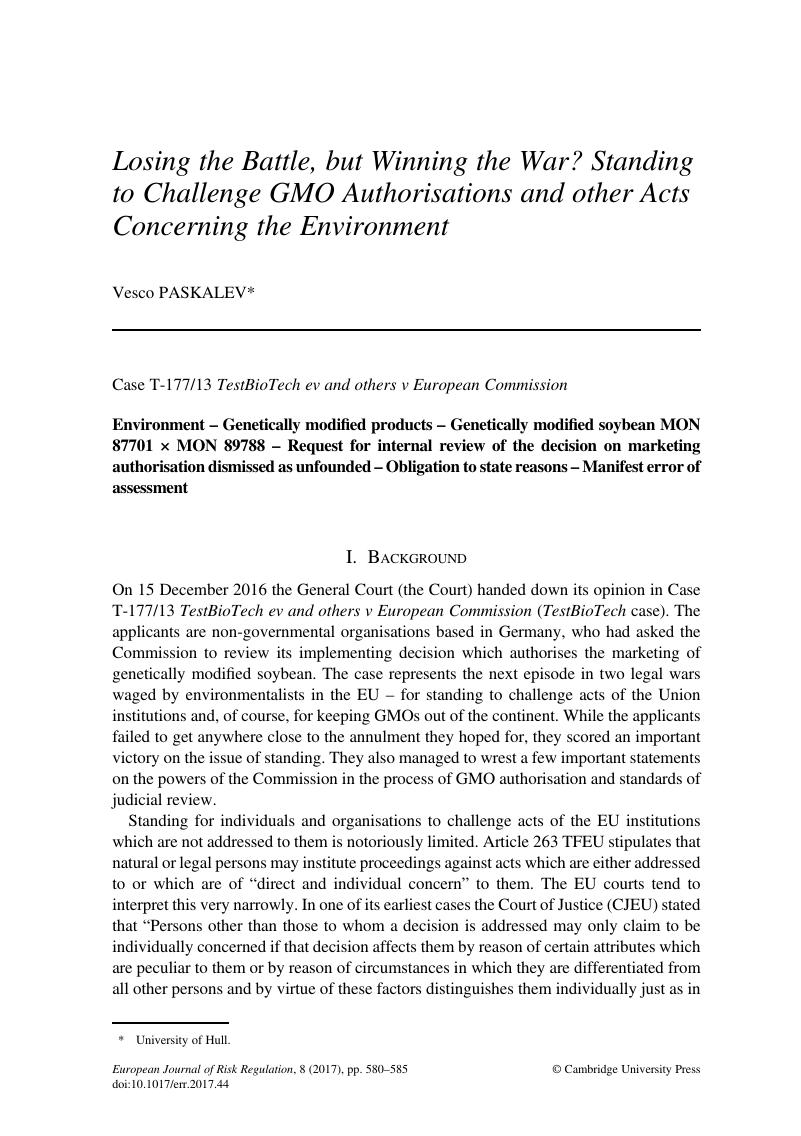No CrossRef data available.
Article contents
Losing the Battle, but Winning the War? Standing to Challenge GMO Authorisations and other Acts Concerning the Environment
Published online by Cambridge University Press: 10 October 2017
Abstract

- Type
- Case Commentary
- Information
- Copyright
- © Cambridge University Press
Footnotes
University of Hull.
References
1 Case C-25/62 Plaumann & Co v Commission [1963] ECLI:EU:C:1963:17.
2 The Lisbon Treaty slightly broadened the rules on standing, by adding to Art 236 that individual applicants may also challenge any “regulatory act which is of direct concern to them and does not entail implementing measures”, ie for such acts they do not need to be individually concerned.
3 The CJEU is oblivious to this and in Case C-321/95, Stichting Greenpeace v Commission [1998] ECLI:EU:C:1998:153 it made clear that even an association of the citizens of an island would not qualify.
4 ACCC/C/2008/32 EU from 24 August 2011 and ACCC/C/2008/32 (EU), Part II, from 17 March 2017, both available at <www.unece.org/env/pp/compliance/Compliancecommittee/32TableEC.html>, accessed 6 September 2017.
5 Regulation (EC) No 1367/2006 on the application of the provisions of the Aarhus Convention on Access to Information, Public Participation in Decision-making and Access to Justice in Environmental Matters to Community institutions and bodies [2006] OJ L 264/13, 25.9.2006.
6 In view of the present author, it is stringent only in the sense that it is subject to too many procedural hurdles. Nevertheless its design is flawed in a way that it guarantees that the industry will get its way in the end of the day. See Paskalev, Vesco, “GMO Regulation in Europe: Undue Delegation, Abdication or Design Flaw?” (2015) 6 EJRR 573 Google Scholar.
7 See Kritikos, Mihail, “Traditional Risk Analysis and Releases of GMOs into the European Union: Space for Non-Scientific Factors?’ (2009) 34 European Law Review 405 Google Scholar.
8 See Communication from the Commission Reviewing the decision-making process on GMOs, COM (2015) 176 final, from 22 April 2015. In TestBioTech the Court finally makes it clear that this understanding is flawed, see below.
9 Different GMO opponents are concerned about very different issues, which include socio-economic impacts, cost of co-existence imposed upon conventional farmers, effect on national health and dietary policies, preservation of existing farming practices and consumption patterns, preserving local skills and bottom-up innovation, environmental policy goals, agricultural policy, town and country planning, etc. Safety, as the term is understood by EFSA and the Commission, is only one factor among many, and maybe even not the most important one.
10 As the UK raised the issue that the soybean in question was authorised for marketing only but not for cultivation and therefore was not raising environmental issues, the Court clarified that because the relevant regulation mentions that it aims to ensure free movement of safe and wholesome food as essential condition for the health and well-being of citizens it can qualify as environmental law for the present purposes (paras 63–64).
11 Notwithstanding the finality of such acts and any rights acquired by third parties, the power of the institutions to withdraw own unlawful administrative acts was confirmed in earlier cases, eg C-362/09 Athinaïki Techniki [2010] ECLI:EU:C:2010:783 and T-53/10 Reisenthel [2011] ECLI:EU:T:2011:601.
12 When discussing the intensity of the review a few paragraphs latter, the Court dismissed the defendants’ argument that the review should be light touch only, acknowledging that the Aarhus Convention guarantees to the public broad access to justice (para 76). One cannot help wondering why the Court did not reason similarly on the question for the scope of review, given that the Convention does not provide differentiated standards.
13 Pleas which were not raised in the request for internal review were found inadmissible.
14 Anais Berthier, ClientEarth, 26 January 2017, available at <www.clientearth.org/general-court-challenge-commission-gm-soybean-decision-first-application-access-justice-rules/> accessed 6 March 2017.
15 ibid.
16 Case T-13/99 Pfizer Animal Health SA v Council [2002] ECLI:EU:T:2002:209.
17 The decision of the General Court was appealed by the applicants and in now pending in the CJEU (Case C-82/17 P). In the meantime the Aarhus Convention Compliance Committee decided, again, that the EU violates its obligations, which may have emboldened them further. On 17 July 2017 the Council unanimously accepted the findings of the Committee (disregarding the Commission’s position on the contrary). Thus, the pressure for broadening the standing is mounting, and the CJEU – which has the final word on interpretation of the treaties – will struggle to square its antiquated doctrine with the international law.




